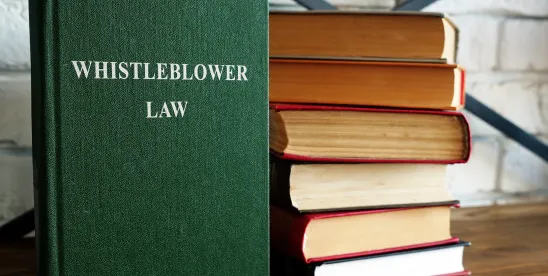The U.S. Securities and Exchange Commission (SEC) brought more actions targeting regulated entities for recordkeeping violations related to employees using noncompany communications platforms, and both the SEC and the U.S. Department of Justice (DOJ) took more actions to enforce their whistleblower programs. These moves are some of the latest by federal enforcement agencies focused on employees and voluntary disclosure of alleged financial crimes and corruption.
Quick Hits
- The SEC has been actively targeting regulated entities for recordkeeping violations related to off-channel communications, with recent settlements involving six credit rating agencies amounting to over $49 million in civil penalties.
- The SEC has also been enforcing actions to protect whistleblowers, announcing settlements with seven public companies for over $3 million in civil penalties for using agreements that allegedly impede employees from reporting securities law violations.
- The DOJ launched the Corporate Whistleblower Awards Pilot Program on August 1, 2024, aiming to incentivize whistleblowers to disclose misconduct by empowering them to share in the net proceeds of any monetary forfeiture recovered by the government.
SEC Targets Off-Channel Communications
On September 3, 2024, the SEC announced that six credit rating agencies agreed to pay more than $49 million in civil penalties to the SEC related to employees using noncompany-controlled texting and other messaging platforms, known as off-channel communications, to discuss their credit rating businesses.
These settlements are the latest in a series of enforcement actions against regulated entities for recordkeeping violations for off-channel communications over the past few years that have resulted in billions of dollars in civil penalties. In August 2024, the SEC levied nearly $400 million in civil penalties against twenty-six other registered broker-dealers, investment advisers, and dually-registered broker-dealers for what the SEC described as “longstanding failures by the firms and their personnel to maintain and preserve electronic communications.”
“We have seen repeatedly that failures to maintain and preserve required records can hinder the staff’s ability to ensure that firms are complying with their obligations and the Commission’s ability to hold accountable those that fall short of those obligations, often at the expense of investors,” Sanjay Wadhwa, deputy director of the SEC’s Division of Enforcement, said in a statement.
The SEC alleged the agencies violated obligations to control personnel and preserve communications in contravention of their recordkeeping provisions set forth in Section 17(a)(1) of the Securities Exchange Act of 1934 and Rule 17g-2(b)(7), which require statistical rating organizations to make and retain certain records and produce them to the SEC.
Four of the charged companies agreed to hire compliance consultants to review their policies on electronic communications and employees’ use of personal devices. The SEC stated that two others had “engaged in significant efforts to comply with the recordkeeping requirements … and otherwise cooperated with the SEC’s investigations.”
SEC Whistleblower Actions
In addition to the recordkeeping actions, the SEC, on September 9, 2024, announced settlements with seven public companies that agreed to pay more than $3 million in civil penalties, collectively, based on allegations they used employee separation agreements or other employment agreements to restrict employees from reporting potential securities law violations.
The SEC alleged that the agreements contained provisions that impeded its whistleblower program. According to the SEC, some of the companies, for example, required employees to waive their rights to potential monetary awards for whistleblowers. The SEC alleged the companies violated the whistleblower protection rule in Rule 21F-17(a), which prohibits actions by employers that may impede an individual from reporting to or communicating with the SEC about potential securities law violations.
Again, these whistleblower actions are the latest in a series of whistleblower rule enforcement actions, as the SEC aggressively investigates and prosecutes employers over separation agreements and employment agreements with nondisclosure provisions that the agency believes impede whistleblowers from coming forward.
DOJ Whistleblower Awards Incentive Program
On August 1, 2024, the DOJ launched a three-year pilot program under which the DOJ will allow whistleblowers, including corporate employees, who disclose relevant information on criminal or civil misconduct within corporations to share in the net proceeds of any monetary forfeiture recovered by the government as an incentive to encourage more whistleblowers.
The “Corporate Whistleblower Awards Pilot Program” is meant to “[f]ill[] important gaps in existing federal whistleblower programs,” including those of the SEC, Commodities Futures Trading Commission (CFTC), and Financial Crimes Enforcement Network (FinCEN), and will “[s]upercharg[e] [the] DOJ’s corporate investigations and prosecutions,” according to a fact sheet released with the announcement of the program.
The pilot program launch follows March 2024 remarks by Deputy Attorney General Lisa Monaco in March 2024, announcing the development of a whistleblower monetary incentives program, in which she referenced Old West “Wanted” posters as an inspiration.
“[W]e are telling employees: If you are aware of criminal misconduct at your company, now is the time to come forward to the Criminal Division,” Principal Deputy Assistant Attorney General Nicole M. Argentieri stated in prepared remarks announcing the new whistleblower incentives pilot program’s launch. “[O]ur message to company executives and leadership is also clear: We are using more tools than ever before to identify corporate misconduct, so now is the time to make the necessary compliance investments to help prevent, detect, and remediate misconduct.”
According to the program guidance, individuals, but not companies, may be eligible for a whistleblower award if the individual voluntarily provides original information to the DOJ about certain criminal or civil violations, including financial misconduct, corruption, and bribery, that leads to a successful forfeiture of at least $1 million. The individual must provide “truthful and complete” information, and the individual must cooperate with the DOJ in the investigation.
The pilot program applies to four areas: (1) “certain crimes involving financial institutions and their employees; (2) foreign corruption involving privately held companies and others that are not issuers of U.S. securities; (3) domestic corruption involving companies; and (4) health care fraud schemes targeting private insurers not subject to qui tam recovery under the False Claims Act.”
This new whistleblower awards pilot program is one of the latest efforts by the DOJ to encourage voluntary disclosure of alleged corporate misconduct and corruption. In April 2024, the DOJ launched a separate pilot program that allows individuals to avoid prosecution in certain circumstances when they voluntarily self-disclose allegations of criminal offenses or white-collar crimes in corporations.





 />i
/>i

